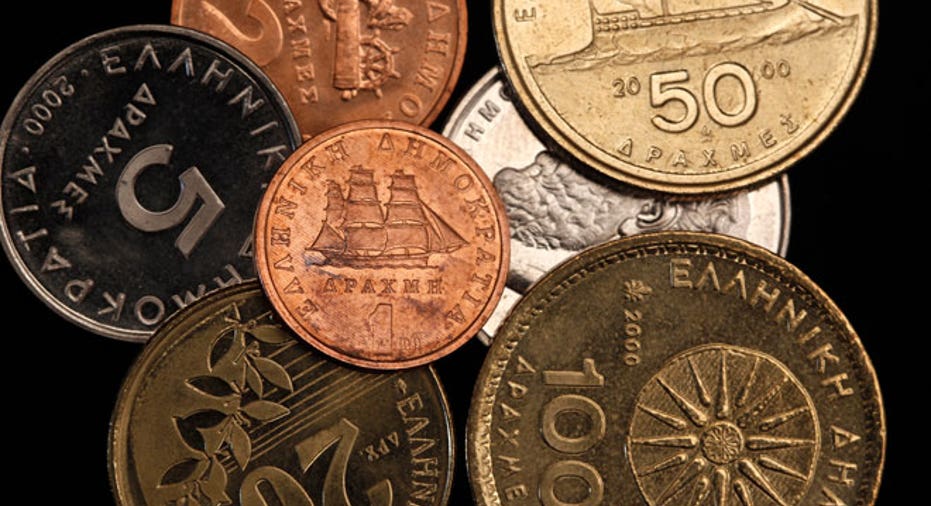Will Greece Dump the Euro? Watch Shares of De La Rue for Clues

The latest guessing game in the global financial markets revolves around whether debt-ridden Greece will remain in the beleaguered eurozone.
Investors searching for clues in this crucial debate should consider closely watching shares of British printing company De La Rue. That’s because the London-listed company is the world’s largest commercial currency printer and could be tapped to help bring back the drachma if Greece finally throws in the towel on the eurozone.
With that in mind, shares of De La Rue have soared more than 13% over the past month as the markets begin to seriously consider the likelihood that Greece could give up the euro. Those double-digit gains easily outperform a 3.7% decline for the British FTSE 100 over that span.
Capitalizing on a Euro Dropout?
Founded in 1813 to print a newspaper, today De La Rue designs and produces more than 150 national currencies around the world, which only has 206 countries. The company generated 2011 revenues of 463.9 million pounds ($744.05 million).
De La Rue declined to comment on the topic of Greece, saying it doesn’t talk about customers or potential customers for contractual reasons.
In November, CEO Tim Cobbold told a British newspaper the eurozone crisis “can create opportunities for us,” noting his company is “very well placed to benefit from any geopolitical change.”
Cobbold, however, pointed out that Greece has state-owned printers it could use to revert back to the drachma.
Still, given the finely-matched supply-and-demand profile in the currency-producing industry, it’s easy to see how De La Rue’s financial outlook could change significantly if it landed a potential drachma assignment or due to an overall tightening of the market caused by a eurozone change.
This could help explain why shares of De La Rue have leaped 24.3% over the past year, compared with an 8.2% decline for the FTSE 100 and a 72.56% plunge for the National Bank of Greece (NYSE:NBG).
Messy Exit Eyed
Due to political setbacks, talk of Greece leaving the eurozone has risen above a whisper in recent weeks, with policymakers openly saying that messy result remains a possibility. That’s a stark change from just months ago when that kind of speculation was brushed aside as nearly impossible.
Asked on Tuesday by a French television reporter whether Greece will exit the common currency, IMF chief Christine Lagarde said, “We certainly don't hope so, from the IMF point of view ... but we have to be technically prepared for anything."
Investors on Intrade.com, a policy betting website, place a 61% chance any country currently using the euro announces its intention to drop it before the end of 2013.
Campbell Harvey, a finance professor at Duke University, pegged the chances of an eventual Greek exit at 80%.
“In order to be credible, the eurozone needs to set an example,” Harvey said in an email. “If a country is offside in the future, they will have a strong incentive to get back on side -- or face the specter of an exit, like Greece's.”
Lagarde warned a Greek exit wouldn’t be pretty, saying, “You can certainly assume it would be quite messy.”
‘Not Like Printing a Newspaper’
That’s because Greece would need to rapidly rebuild its currency apparatus after more than a decade under the euro, throwing into question its banking system and creating legal problems.
In fact, the European Union’s treaties don’t include a legal provision to kick a country out of the euro, meaning Greece would have to choose an exit as the lesser of two evils.
If Greece was seriously considering this as an option in the future, it may want to begin preparing for it now because it would take serious time to bring back the drachma.
“It will typically take many months to design a banknote, which effectively acts as a company’s calling card. It’s not like printing a newspaper or a magazine. It takes months rather than hours or days,” an industry source told FOX Business.
That’s because the currency must include sophisticated measures aimed at defeating counterfeiters as well as creating durability.
"I don't think you could do it much faster than four months," Mark Crickett, one of De La Rue's consultants, told BBC Radio 4 in February.
De La Rue was tapped to print and distribute new banknotes for Iraq after the U.S.-led invasion to topple Saddam Hussein. According to the Financial Times, this job took less than three months but that was only after help from a squadron of 27 Boeing (NYSE:BA) 747s and 500 armed guards.



















